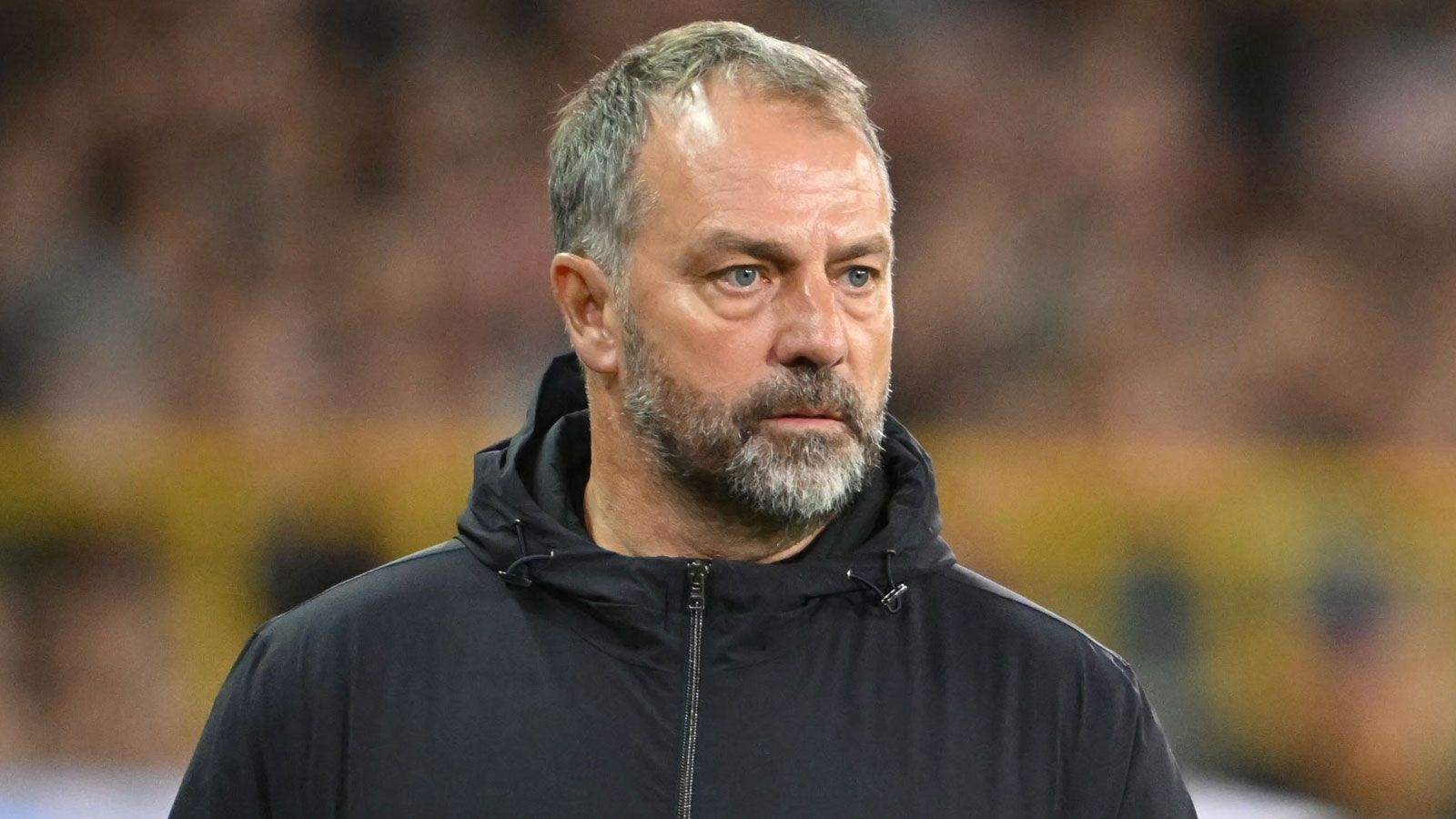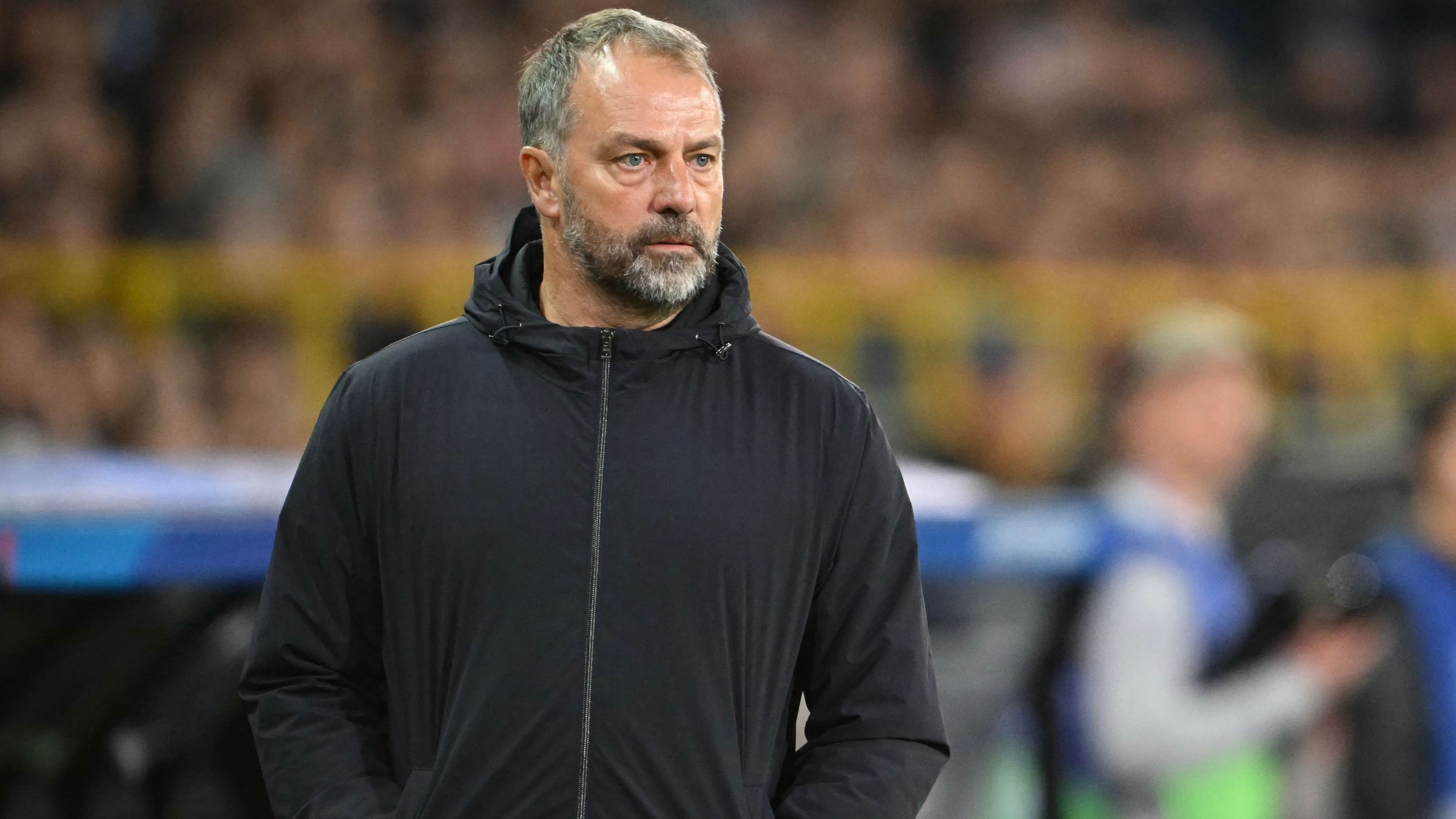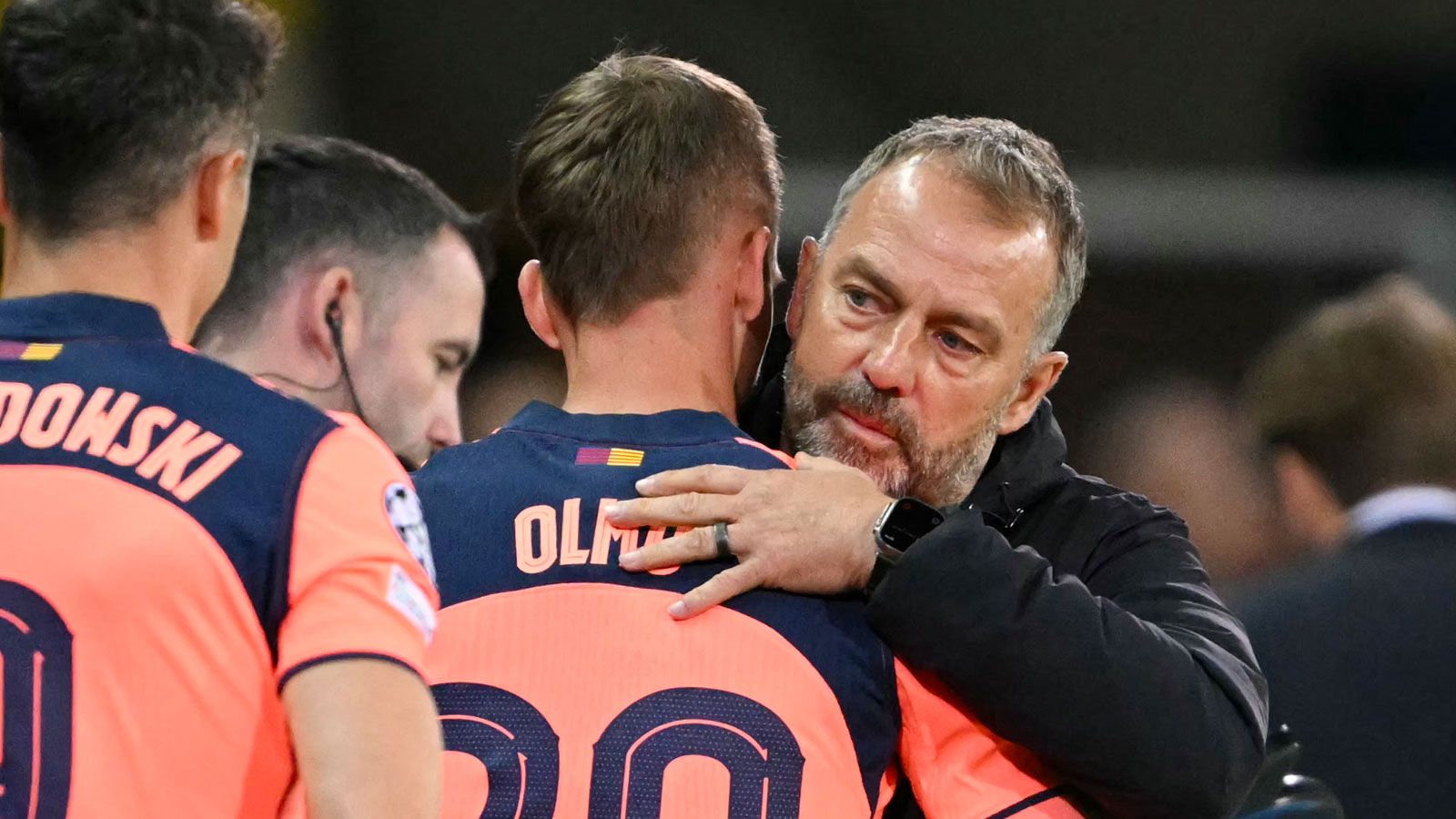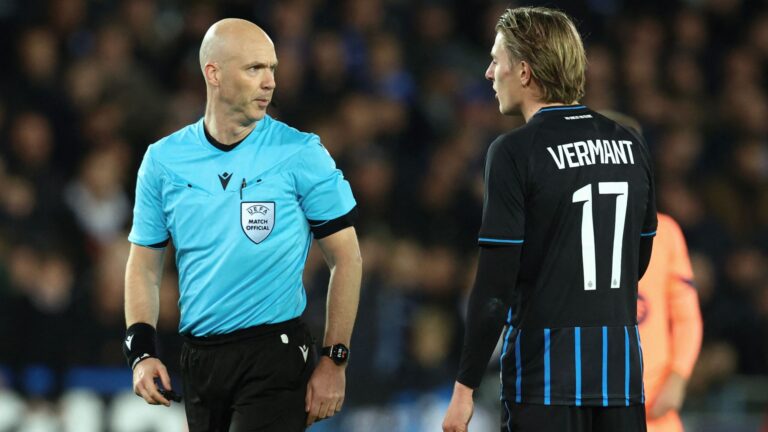


Hansi Flick Defends Barcelona’s Tactical Approach Amid Champions League Setback
In a display that highlighted both resilience and vulnerability, Barcelona‘s quest for Champions League glory encountered another hurdle with a dramatic 3-3 stalemate against Club Brugge. This outcome extends their streak of matches without a shutout to nine, echoing a defensive low point from 2013 when the team allowed goals in 13 games in a row, raising fresh concerns about their backline stability.
Barcelona’s Defensive Challenges in the Spotlight
Throughout the encounter in Belgium, Hansi Flick’s squad was constantly on the back foot, as the home team capitalized on Barcelona‘s forward-pressing defense to net three goals, compelling the visitors to fight back each time. While their ability to recover was admirable, the evident weaknesses in possession defense were hard to overlook and pointed to ongoing tactical flaws.
Match Outcome and Current Standing
This result positions Barcelona with seven points after four group-stage fixtures, keeping them in a competitive spot yet exposing potential risks ahead. Post-game, Flick appeared visibly disappointed, suggesting upcoming discussions with his players while rejecting claims that his strategic framework was the root cause.
Flick’s Firm Stance on Team Philosophy
In his interview with Movistar+, the coach emphasized that although the team’s energy levels fell short, he remains committed to their core playing style. “We have the capability to fortify our defense in the attacking zone, yet we’ll hold fast to our principles since improvement is within reach,” Flick noted. “Without sufficient drive, success is out of the question, particularly in the Champions League. Club Brugge performed admirably as anticipated, and I communicated that to the squad. That prior 1-0 might have been offside by a couple of meters, but our focus is on executing our plan. A 3-3 tie isn’t ideal, though the key takeaway is our repeated comebacks from behind. Still, we must address this internally.”
Analyzing Key Pitch Problems
Flick delved deeper into the team’s difficulties across critical areas: “Defense isn’t solely about the rear guard; it’s equally vital in the midfield. We need to stay vigilant against opponents who build attacks swiftly in just one or two passes. It’s a tough challenge, no doubt. We generated plenty of opportunities, but credit to them-they were dynamic and assertive in a constructive manner.”
Struggles with Pressing and Midfield Control
The 60-year-old coach acknowledged the failure to maintain their typical high-press approach, a pattern that’s emerged recently. “Honestly, we’ve struggled to win back the ball effectively; we’ve dropped too many battles, especially in the center, which was pivotal against their speedy lineup. For us, the emphasis is on energy without possession. Most importantly, we have to be ready for quick transitions. I’m confident we’ll make strides here.”
Responding to Calls for Tactical Shifts
In the face of demands for strategic adjustments, the former Bayern Munich leader insisted that Barcelona‘s issues stem from implementation, not their foundational beliefs. “It’s all about the collective,” he stated. “We shone last Sunday, but not as much today. This is something we need to refine. We’re still the same group. We recognize this isn’t our peak phase, but I’m optimistic that once players like Joan Garcia, Raphinha, and Pedri are back, and with Olmo and Lewandowski stepping up, we’ll see progress.”
Commitment to Barcelona’s Identity
When questioned about overhauling the setup, Flick responded decisively: “I won’t keep reiterating. The answer isn’t in altering our approach. We embody Barcelona. Our game revolves around proactive play and vigor, both on and off the ball. We must focus on development, and once the injured players return, we’ll evaluate our next steps.”
Future Prospects for Barcelona
Following the draw in Brugge, Barcelona sits at 11th in the Champions League rankings, remaining in the race but battling inconsistency. Flick now must rally his fatigued team for their upcoming La Liga clash with Celta Vigo on Sunday, where the side holds second place, trailing leaders Real Madrid by five points.
Even through the uncertainty, Flick holds firm that enhancing focus and determination, rather than major changes, will restore the team’s prowess. As he expressed, “We are Barcelona. We don’t give in-we evolve.”
Hansi Flick’s Stern Lecture to Barcelona Squad
The Match Against Club Brugge: A Shocking Turn of Events
In a recent UEFA Champions League clash, Barcelona faced Club Brugge in what was expected to be a straightforward victory for the Catalan giants. However, the match ended in an unexpected draw, leaving fans and analysts stunned. This result highlighted potential issues within the Barcelona squad, including lapses in focus and execution under pressure. Keywords like “Hansi Flick stern lecture” and “Barcelona vs Club Brugge draw” have been trending as media outlets dissect the fallout.
The game saw Barcelona dominate possession but struggle to convert chances, with Club Brugge’s resilient defense holding firm. This draw not only dented Barcelona’s standing in the group stage but also raised questions about the team’s overall strategy and mental toughness. For anyone following European football, moments like these remind us how unpredictable the sport can be, even for powerhouses like Barcelona.
Breaking Down Hansi Flick’s Stern Lecture
Following the draw, Hansi Flick didn’t hold back in addressing his players. In a post-match team meeting, the German coach delivered a stern lecture that emphasized accountability and high standards. Flick, known for his no-nonsense approach, reportedly challenged the squad on their complacency and lack of intensity, making it clear that such performances wouldn’t be tolerated moving forward.
Key points from Flick’s lecture included:
- Urgency in every game: He stressed the need for consistent effort, pointing out that even against less-favored opponents like Club Brugge, Barcelona must maintain their “Hansi Flick philosophy” of relentless pressing and quick transitions.
- Individual responsibility: Players were called out for missed opportunities, with Flick highlighting how personal errors can derail the team’s collective goals.
- Team unity and focus: He reminded the squad that winning titles requires mental resilience, using the draw as a wake-up call to rebuild their focus for upcoming fixtures.
This approach aligns with Flick’s reputation as a coach who demands excellence, drawing from his successful tenure with Bayern Munich. By incorporating elements of his philosophy early in his Barcelona stint, he’s aiming to foster a culture of winning that resonates with fans searching for “Hansi Flick Barcelona tactics.”
Why the Lecture Was Necessary
Flick’s decision to deliver a stern lecture stemmed from the broader context of Barcelona’s season. After taking over, he’s been working to instill a high-pressing, possession-based style that prioritizes speed and precision. The Club Brugge draw exposed vulnerabilities, such as defensive lapses and poor decision-making in the final third, which directly contradicted his vision.
In discussions with the media, Flick explained that such setbacks are part of the process, but they require immediate correction. He noted that his philosophy isn’t about avoiding mistakes but learning from them, a principle that’s becoming a cornerstone for Barcelona’s revival. For readers interested in football management, this event underscores how coaches like Flick use criticism as a tool for growth.
Defending His Philosophy Amid Criticism
Hansi Flick has faced scrutiny since joining Barcelona, with some critics questioning whether his philosophy-rooted in high-energy football and tactical flexibility-fits the club’s traditional style. After the draw, Flick took the opportunity to defend his approach, arguing that it’s essential for long-term success in modern football.
He outlined several core aspects of his philosophy:
- High pressing and counter-pressing: Flick believes this tactic allows Barcelona to regain possession quickly, reducing opponents’ chances and creating scoring opportunities. In the Club Brugge game, he pointed out lapses in this area as a key reason for the draw.
- Player development and roles: Emphasizing adaptability, Flick defended his rotation strategy, which ensures players like young talents in the squad get exposure while veterans maintain peak performance.
- Balanced attack and defense: Unlike some past Barcelona eras focused solely on flamboyant attacks, Flick’s philosophy integrates defensive solidity, as seen in his insistence on collective defending.
Challenges and Adaptations in Flick’s Approach
Despite the criticism, Flick remains optimistic about adapting his philosophy to Barcelona’s unique squad. He highlighted how injuries and fixture congestion have impacted implementation, but he’s committed to refining tactics for better results. For instance, in training sessions post-draw, the focus shifted to scenarios that mimic high-stakes games, helping players internalize his strategies.
Experts in football analysis have noted that keywords like “Hansi Flick defensive philosophy” are gaining traction, as fans debate whether this approach can lead Barcelona to Champions League glory. Flick’s defense of his methods shows his confidence, drawing parallels to his Bayern days where similar tactics yielded multiple titles.
The Impact on Barcelona’s Season Moving Forward
As Barcelona prepares for their next challenges, the ripple effects of Flick’s lecture are already evident. Training sessions have reportedly intensified, with a greater emphasis on the elements that define his philosophy, such as speed, precision, and team cohesion. This could be a turning point, turning the unexpected draw into a catalyst for improvement.
To make this more relatable, think about how a coach’s words can reshape a team’s season-just like in other sports, where a single event sparks a comeback. Fans tracking “Hansi Flick Barcelona updates” will want to watch how these changes play out in upcoming matches.
Key Takeaways for Football Enthusiasts
- Bullet points on what makes Flick’s philosophy effective:
- Prioritizes quick transitions to exploit spaces.
- Encourages player accountability for sustained performance.
- Balances creativity with defensive discipline, crucial in competitive leagues.
- How to stay updated: Follow reliable football news for insights on “Hansi Flick stern lecture outcomes,” ensuring you’re in the loop for Barcelona’s progress.
In essence, Flick’s response to the Club Brugge draw exemplifies the demands of top-tier management, blending criticism with strategic vision to keep Barcelona competitive. With the right adjustments, his philosophy could redefine the team’s identity in the coming months.









